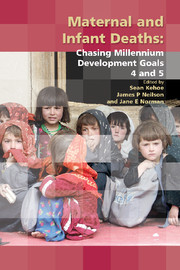Book contents
- Frontmatter
- Contents
- Participants
- Declaration of personal interests
- Preface
- The Millennium Development Goals
- SECTION 1 THE SIZE OF THE PROBLEM
- SECTION 2 CLINICAL PROBLEMS AND SOLUTIONS – MATERNAL
- SECTION 3 CLINICAL PROBLEMS AND SOLUTIONS – NEONATAL
- 12 Innovations for improving newborn survival in developing countries: do integrated strategies for maternal and newborn care matter?
- 13 Community interventions to reduce maternal and child mortality in low-income countries
- SECTION 4 TRAINING AND DEVELOPMENT
- SECTION 5 SPECIFIC CHALLENGES IN SPECIFIC COUNTRIES
- SECTION 6 CONSENSUS VIEWS
- Index
13 - Community interventions to reduce maternal and child mortality in low-income countries
from SECTION 3 - CLINICAL PROBLEMS AND SOLUTIONS – NEONATAL
Published online by Cambridge University Press: 05 February 2014
- Frontmatter
- Contents
- Participants
- Declaration of personal interests
- Preface
- The Millennium Development Goals
- SECTION 1 THE SIZE OF THE PROBLEM
- SECTION 2 CLINICAL PROBLEMS AND SOLUTIONS – MATERNAL
- SECTION 3 CLINICAL PROBLEMS AND SOLUTIONS – NEONATAL
- 12 Innovations for improving newborn survival in developing countries: do integrated strategies for maternal and newborn care matter?
- 13 Community interventions to reduce maternal and child mortality in low-income countries
- SECTION 4 TRAINING AND DEVELOPMENT
- SECTION 5 SPECIFIC CHALLENGES IN SPECIFIC COUNTRIES
- SECTION 6 CONSENSUS VIEWS
- Index
Summary
This chapter considers progress towards maternal and child survival, the recent evidence for community health worker interventions to reduce newborn mortality and newer evidence about the effect of community mobilisation through women's groups for newborn survival. We also consider the potential for community interventions to augment health service strengthening as a way to reduce maternal mortality through family planning, financial incentives for institutional delivery and community delivery of life-saving drugs, especially in Africa. Finally, we consider the shortfall in investment for maternal and newborn health and the failure of donors and governments to provide anything close to what is required if progress is to be made towards maternal and newborn survival in the poorest countries.
Progress towards maternal and child survival
The Millennium Development Goals (MDGs) 4 and 5 expressed targets to reduce under-five mortality by two-thirds and maternal mortality by three-quarters in every country, with 1990 as the baseline year and 2015 as the endpoint. In 2008, the Countdown to 2015 report described progress in 68 target countries with high baseline mortality rates. Some were on track towards the under-five mortality target, namely Bangladesh, Brazil, Egypt, Indonesia, Mexico, Nepal, the Philippines, China, Haiti, Morocco and Turkmenistan. A further 28 priority countries (41%) had made insufficient progress in reducing under-five mortality, and 25 (37%) had made no progress at all. In 12 countries (Botswana, Cameroon, Central African Republic, Chad, Congo, Equatorial Guinea, Kenya, Lesotho, South Africa, Swaziland, Zambia and Zimbabwe), under-five mortality had increased.
- Type
- Chapter
- Information
- Maternal and Infant DeathsChasing Millennium Development Goals 4 and 5, pp. 205 - 216Publisher: Cambridge University PressPrint publication year: 2010



